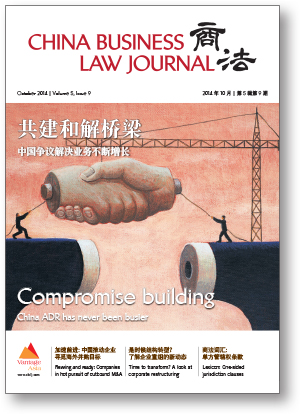This month’s China Business Law Journal is all about the surge, the upward swing, the rising trend – the uptick. Coinciding with Hong Kong Arbitration Week 2014, a popular event that draws the best arbitrators from China and around the world, our cover story, Compromise building, notes that the much anticipated wave of dispute resolution-related business in China has well and truly arrived, and it’s not just law firms that are capitalising on this uptick.
Compromise building notes that arbitration institutions, in China and Hong Kong in particular, and local courts have seen a surge in work as more Chinese and foreign parties test the waters, and more are prepared to use China as a dispute resolution platform. Standards are improving as institutions move quickly to internationalise their services and lure their slice of this lucrative pie away from overseas institutions, while other jurisdictions like Hong Kong position themselves to be primary service providers in the region.
Concerns remain. Many foreign parties involved in disputes arising from cross-border deals or business co-operation still point to a lack of independence within China’s judicial system and arbitration bodies. But difficulties in enforcing awards from other jurisdictions just may be the clincher for many of these to turn to the more reputable of the homegrown institutions.
The shadow over CIETAC’s split with its Shanghai and Shenzhen sub-commissions prevails, and inconsistencies in court decisions have prompted Supreme Court advice. But greater transparency than ever, and a previously unseen desire by Chinese companies to engage in arbitration or litigation to defend their rights, should ensure the sector continues to thrive.
Revving and ready takes a look at the race for outbound investment being driven by regulatory easing and encouragement for privately owned enterprises to make their way on the world M&A stage. Revving and ready looks at what Chinese investors are interested in, and where. New rules on outbound M&A include that only record filing is required for outbound investments of less than US$1 billion. Circular No. 29 has eliminated the State Administration of Foreign Exchange approval requirement before registration, and now only post registration is required, which opens a long blocked financing channel for Chinese outbound investment. Experts say these improvements have opened the floodgates, but they warn that a lack of global experience means some Chinese companies rely too much on the operation platform of target companies, which has resulted in failed investments. A clear strategy is imperative.
Finally, Time to transform? explores the surge in corporate restructuring in China, a trend widely expected to continue into next year. Corporate structures that once made sense are being reviewed and transformed, and being prepared for such change has never made more sense. Time to transform? offers some timely advice on a few choice possibilities, examining case examples from the involuntary and voluntary areas of this sector.






















